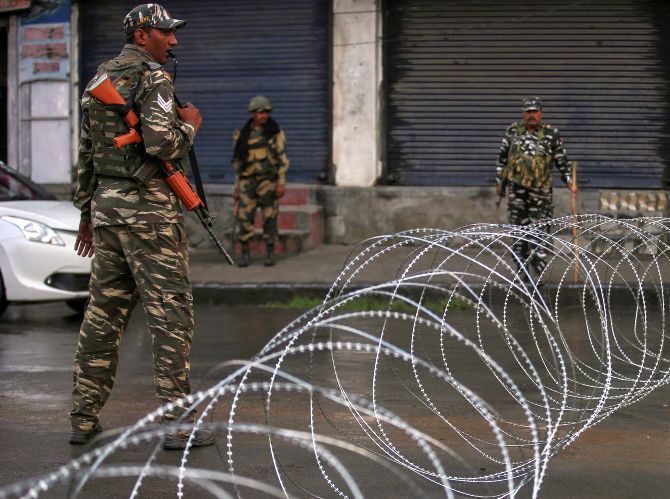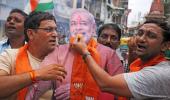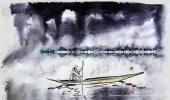
Most phone lines in Kashmir will be restored over the weekend and schools will reopen next week, Jammu and Kashmir Chief Secretary B V R Subrahmanyam said on Friday while announcing the easing of restrictions in a phased and 'orderly way'.
Offices of the Jammu and Kashmir government in the Valley functioned normally on Friday and the attendance in many offices was 'quite high', Subrahmanyam said at a press conference.
He said there has been no loss of life or major injury since restrictions were imposed on August 5, when Jammu and Kashmir's special status under Article 370 was revoked and the state bifurcated into two Union Territories.
"...There will be easing of restrictions in the next few days in an orderly way," Subrahmanyam told reporters in Srinagar, adding that steps would be taken keeping in view the evolving situation as well as the cooperation of the people in maintaining calm and peace.
"Schools will be opened after the weekend area-wise so that children's studies do not suffer," he said.
Telecom connectivity, a major point of concern, will gradually be eased and restored in a phased manner keeping in mind the constant threat posed by terrorist organisations in using mobile connectivity to organise terror actions, Subrahmanyam said.
Asked about the restoration of telephone lines, he said, "You will see gradual restoration from tonight and tomorrow (Saturday) onwards. You will find a lot of Srinagar functioning tomorrow (Saturday) morning.
"BSNL takes a couple of hours to get back to action. Exchange by exchange they will be switching it on. Over the weekend, you will have most of these lines functional."
12 districts in Jammu and Kashmir out of 22 were functioning normally while there was limited night-time restrictions only in five districts.
"After today's Friday prayers, immediate reports suggest that things have gone off quite peacefully right throughout the state," he said.
Earlier in the morning in the national capital, Solicitor General Tushar Mehta said in the Supreme Court that people should trust the security forces deployed in Jammu and Kashmir and authorities are taking stock of situation on day-to-day basis.
He told the court, hearing a petition by Kashmir Times Executive Editor Anuradha Bhasin, that some time should be given to bring normalcy in the region.
Bhasin had sought removal of restrictions imposed on working of journalists in the state after scrapping of provisions of Article 370 and the restoration of all modes of communication, including mobile, internet and landline services, throughout the state.
The UN Security Council is meeting on Friday evening to discuss India revoking Jammu and Kashmir's special status.
Addressing the media in the Valley's principal city, the Jammu and Kashmir chief secretary said, "We have prevented any loss of human life despite concerted efforts by terrorist organisations, radical groups and continuing efforts by Pakistan to destabilise the situation."
As restrictions on the movement of people are removed area by area, movement of public transport will be allowed in these areas too, the senior official said.
"It is expected that over the next few days as the restrictions get eased, life in Jammu and Kashmir will become completely normal.
"This is already visible on the roads as the roads are full of regular traffic and we expect to an increase in the coming days," he said.
Preventive detentions, he said, are being continuously reviewed. Appropriate decisions will be made based on law and order assessments, he added.
Subrahmanyam said the administration appreciates the fact that the cooperation of the people of Jammu and Kashmir is critical in helping maintain peace and public order.
"Focus is that, at the earliest, normalcy returns while ensuring that terrorist forces are given no opportunity to wreak havoc as in the past," he said.
The chief secretary said the government had taken steps to ensure there was no shortage of essentials and medicines during the period of restrictions.
The government's approach, he stressed, was guided by the conviction that all-round development was the most credible solution to address separatist sentiments propagated by vested interests.
"Among the groups that are well-known for sponsoring violence and carrying out such attacks are Lashkar-e-Taiba, Jaish-e-Mohammed, Hizbul Mujahideen,etc. Their record has been recognised by governments worldwide and by international organisations, including the UN," he said.
In implementing the decisions taken last fortnight, this history of cross-border terrorism required the government to put in place certain preventive steps as a precautionary measure, Subrahmanyam explained.
Giving a rationale for the government's moves, he said there were credible inputs that terror groups were planning strikes in the state in the immediate future.
The steps consequently taken included restrictions on free movement, prevention of large gatherings, restrictions on telecom connectivity and closure of schools and colleges.
A few preventive detentions of individuals were made in accordance with the provisions of the law to maintain peace, Subrahmanyam said.
A media centre was set up to enable media to cover events in the state with regular press briefings by senior officials, he told journalists.
All major newspapers are being published and satellite and cable TV networks are operational, the chief secretary said.











 © 2025
© 2025